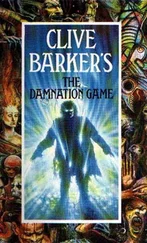Clive Barker - The Great and Secret Show
Здесь есть возможность читать онлайн «Clive Barker - The Great and Secret Show» — ознакомительный отрывок электронной книги совершенно бесплатно, а после прочтения отрывка купить полную версию. В некоторых случаях можно слушать аудио, скачать через торрент в формате fb2 и присутствует краткое содержание. Жанр: Ужасы и Мистика, на английском языке. Описание произведения, (предисловие) а так же отзывы посетителей доступны на портале библиотеки ЛибКат.
- Название:The Great and Secret Show
- Автор:
- Жанр:
- Год:неизвестен
- ISBN:нет данных
- Рейтинг книги:5 / 5. Голосов: 1
-
Избранное:Добавить в избранное
- Отзывы:
-
Ваша оценка:
- 100
- 1
- 2
- 3
- 4
- 5
The Great and Secret Show: краткое содержание, описание и аннотация
Предлагаем к чтению аннотацию, описание, краткое содержание или предисловие (зависит от того, что написал сам автор книги «The Great and Secret Show»). Если вы не нашли необходимую информацию о книге — напишите в комментариях, мы постараемся отыскать её.
The Great and Secret Show — читать онлайн ознакомительный отрывок
Ниже представлен текст книги, разбитый по страницам. Система сохранения места последней прочитанной страницы, позволяет с удобством читать онлайн бесплатно книгу «The Great and Secret Show», без необходимости каждый раз заново искать на чём Вы остановились. Поставьте закладку, и сможете в любой момент перейти на страницу, на которой закончили чтение.
Интервал:
Закладка:
Sitting at the crossroads he began to understand that America had a secret life; one which he'd never even glimpsed before. Love and death he knew about. Love and death were the great clichés; the twin obsessions of songs and soap operas. But there was another life, which every fortieth letter, or fiftieth, or hundredth, hinted at, and every thousandth stated with a lunatic plainness. When they said it plain, it was not the whole truth, but it was a beginning, and each of the writers had their own mad way of stating something close to un-stateable.
What it came down to was this: the world was not as it seemed. Not remotely as it seemed. Forces conspired (governmental, religious, medical) to conceal and silence those who had more than a passing grasp of that fact, but they couldn't gag or incarcerate every one of them. There were men and women who slipped the nets, however widely flung; who found back-roads to travel where their pursuers got lost, and safe houses along the way where they'd be fed and watered by like visionaries, ready to misdirect the dogs when they came sniffing. These people didn't trust Ma Bell, so they didn't use telephones. They didn't dare assemble in groups of more than two for fear of attracting attention to themselves. But they wrote. Sometimes it was as if they had to, as if the secrets they kept sealed up were too hot, and burned their way out. Sometimes it was because they knew the hunters were on their heels and they'd have no other chance to describe the world to itself before they were caught, drugged and locked up. Sometimes there was even a subversive glee in the scrawlings, sent out with deliberately indistinct addresses in the hope that the letter would blow the mind of some innocent who'd received it by chance. Some of the missives were stream-of-consciousness rantings, others precise, even clinical, descriptions of how to turn the world inside out by sex-magic or mushroom-eating. Some used the nonsense imagery of National Enquirer stories to veil another message. They spoke of UFO sightings and zombie cults; news from Venusian evangelists and psychics who tuned in to the dead on the TV. But after a few weeks of studying these letters (and study it was; he was like a man locked in the ultimate library) Jaffe began to see beyond the nonsenses to the hidden story. He broke the code; or enough of it to be tantalized. Instead of being irritated each day when Homer opened the door and had another half dozen satchels of letters brought in, he welcomed the addition. The more letters, the more clues; the more clues the more hope he had of a solution to the mystery. It was, he became more certain as the weeks turned into months and the winter mellowed, not several mysteries but one. The writers whose letters were about the Veil, and how to draw it aside, were finding their own way forward towards revelation; each had his own particular method and metaphor; but somewhere in the cacophony a single hymn was striving to be sung.
It was not about love. At least not as the sentimentalists knew it. Nor about death, as a literalist would have understood the term. It was—in no particular order—something to do with fishes, and the sea (sometimes the Sea of Seas); and three ways to swim there; and dreams (a lot about dreams); and an island which Plato had called Atlantis, but had known all along was some other place. It was about the end of the World, which was in turn about its beginning. And it was about Art.
Or rather, the Art.
That, of all the codes, was the one he beat his head hardest against, and broke only his brow. The Art was talked about in many ways. As The Final Great Work. As The Forbidden Fruit. As da Vinci's Despair or The Finger in the Pie or The Butt-Digger's Glee. There were many ways to describe it, but only one Art. And (here was a mystery) no Artist.
"So, are you happy here?" Homer said to him one May day.
Jaffe looked up from his work. There were letters strewn all around him. His skin, which had never been too healthy, was as pale and etched upon as the pages in his hand.
"Sure," he said to Homer, scarcely bothering to focus on the man. "Have you got some more for me?"
Homer didn't answer at first. Then he said: "What are you hiding, Jaffe?"
"Hiding? I'm not hiding anything."
"You're stashing stuff away you should be sharing with the rest of us."
"No I'm not," Jaffe said. He'd been meticulous in obeying Homer's first edict, that anything found among the dead letters be shared. The money, the skin magazines, the cheap jewelry he'd come across once in a while; it all went to Homer, to be divided up. "You get everything," he said. "I swear."
Homer looked at him with plain disbelief. "You spend every fucking hour of the day down here," he said. "You don't talk with the other guys. You don't drink with 'em. Don't you like the smell of us, Randolph? Is that it?" He didn't wait for an answer. "Or are you just a thief?"
"I'm no thief," Jaffe said. "You can look for yourself." He stood up, raising his hands, a letter in each. "Search me."
"I don't want to fucking touch you," came Homer's response. "What do you think I am, a fucking fag?" He kept staring at Jaffe. After a pause he said: "I'm going to have somebody else come down here and take over. You've done five months. It's long enough. I'm going to move you."
"I don't want—"
"What?"
"I mean...what I mean to say is, I'm quite happy down here. Really. It's work I like doing."
"Yeah," said Homer, clearly still suspicious. "Well from Monday you're out."
"Why?"
"Because I say so! If you don't like it find yourself another job."
"I'm doing good work, aren't I?" Jaffe said.
Homer was already turning his back.
"It smells in here," he said as he exited. "Smells real bad."
There was a word Randolph had learned from his reading which he'd never known before: synchronicity. He'd had to go buy a dictionary to look it up, and found it meant that sometimes events coincided. The way the letter writers used the word it usually meant that there was something significant, mysterious, maybe even miraculous in the way one circumstance collided with another, as though a pattern existed that was just out of human sight.
Such a collision occurred the day Homer dropped his bombshell, an intersecting of events that would change every-thing. No more than an hour after Homer had left, Jaffe took his short-bladed knife, which was getting blunt, to an envelope that felt heavier than most. He slit it open, and out fell a small medallion. It hit the concrete floor: a sweet ringing sound. He picked it up, with fingers that had been trembling since Homer's exit. There was no chain attached to the medallion, nor did it have a loop for that purpose. Indeed it wasn't attractive enough to be hung around a woman's neck as a piece of jewelry, and though it was in the form of a cross closer inspection proved it not to be of Christian design. Its four arms were of equal length, the full span no more than an inch and a half. At the intersection was a human figure, neither male nor female, arms outstretched as in a crucifixion, but not nailed. Spreading out along the four routes were abstract designs, each of which ended in a circle. The face was very simply rendered. It bore, he thought, the subtlest of smiles.
He was no expert on metallurgy, but it was apparent the thing was not gold or silver. Even if the dirt had been cleaned from it he doubted it would ever gleam. But there was something deeply attractive about it nevertheless. Looking at it he had the sense he'd sometimes had waking in the morning from an intense dream but unable to remember the details. This was a significant object, but he didn't know why. Were the sigils spreading from the figure vaguely familiar from one of the letters he'd read, perhaps? He'd scanned thousands upon thousands in the last twenty weeks, and many of them had carried little sketches, obscene sometimes, often indecipherable. Those he'd judged the most interesting he'd smuggled out of the Post Office, to study at night. They were bundled up beneath the bed in his room. Perhaps he'd break the dream-code on the medallion by- careful examination of those.
Читать дальшеИнтервал:
Закладка:
Похожие книги на «The Great and Secret Show»
Представляем Вашему вниманию похожие книги на «The Great and Secret Show» списком для выбора. Мы отобрали схожую по названию и смыслу литературу в надежде предоставить читателям больше вариантов отыскать новые, интересные, ещё непрочитанные произведения.
Обсуждение, отзывы о книге «The Great and Secret Show» и просто собственные мнения читателей. Оставьте ваши комментарии, напишите, что Вы думаете о произведении, его смысле или главных героях. Укажите что конкретно понравилось, а что нет, и почему Вы так считаете.








